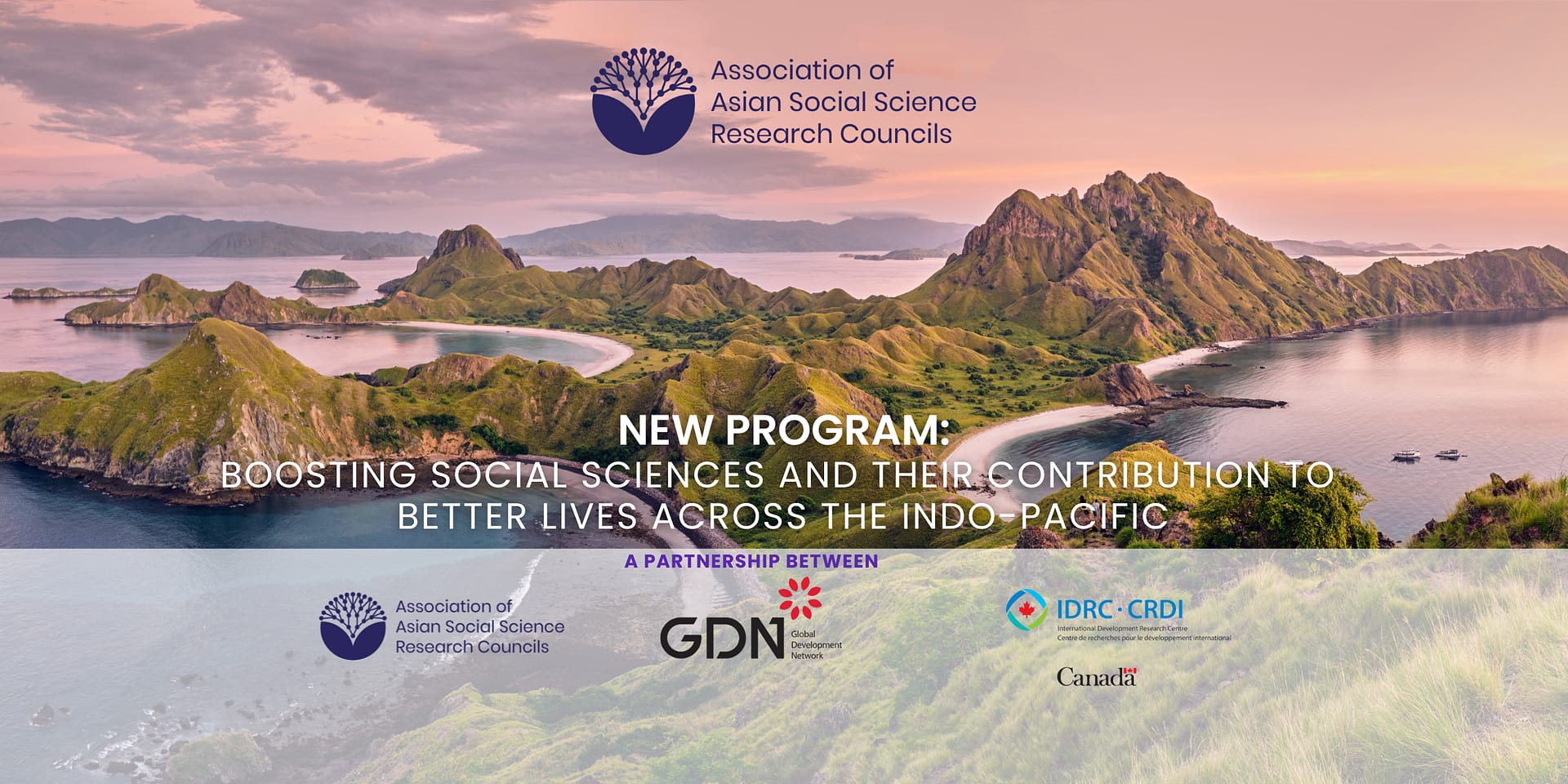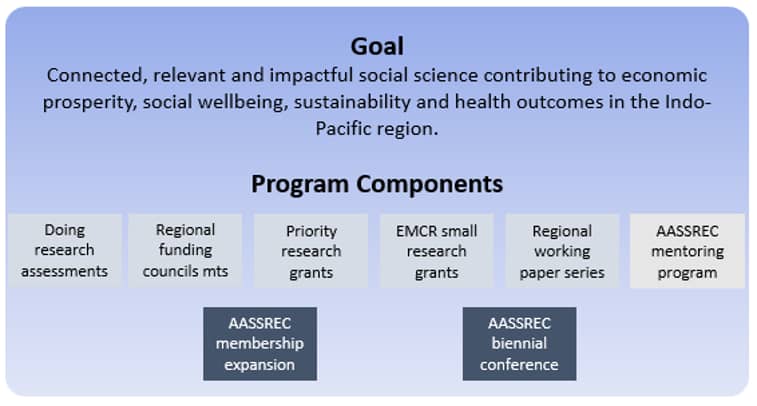Boosting Social Sciences and their Contribution to Better Lives across the Indo-Pacific

‘Boosting Social Sciences and their Contribution to Better Lives across the Indo-Pacific’ is a coordinated program of activity focused on mapping and understanding the current state and opportunities for social science, supporting high-priority research initiatives through strategic research grants; and connecting and empowering social science research organisations, councils and funders across the region to collaborate and engage with policy-makers to enhance research impact and improve lives.
The program is a collaborative partnership between the Association of Asian Social Science Research Councils (AASSREC) and the Global Development Network (GDN), generously funded by Canada’s International Development Research Centre (IDRC). Between November 2023 and April 2026 it will:
- Map social science research capacity, infrastructure, challenges and priorities across the region through a series of deep-dive country assessments
- Facilitate engagement, collaborative planning and enduring networks among regional social science funding councils.
- Support coordinated regional social science research–with a particular focus on women, early- and mid-career social scientists, and researchers from minority groups and developing countries–through travel grants, priority research grants, policy papers and researcher mentoring activities.
In doing so, the program will create a lasting legacy of:
- stronger and more collaborative regional social science councils and networks
- greater understanding of regional strengths, challenges and priorities
- increased social science research involvement and capacity in the region, particularly among women, minority groups and researchers from developing countries.

In addition, through engagement with funding bodies and research end-users, the program aims to achieve an increased focus on social science research and expertise as a key enabler of social and economic development within countries and across the region.
Program Components
Outcome One: Increased understanding of priorities, capacity, and infrastructure
GDN Doing Research Assessments. Program funding will be used flexibly by GDN to support competitively selected local research teams to implement a Doing Research Assessment (DRA) in two or more Indo-Pacific countries. The DRA utilises an original mixed-method methodology to map, critically assess and generate comparative data on the production, circulation and uptake of social science research in a given country. When covering multiple countries in a region, the initiative allows researchers to document, benchmark and contextualise the evolution of social science systems, in light of both their common trajectories and their diversity. Regular updates also provide the ability to track change in and across research systems in a region. The aim of the initiative is to inform better policies and strategic investments in national and regional research systems, in line with calls for transitioning towards evidence-informed policy in other sectors.
Outcome Two: Boosting research capacity through focused regional research activities
Regional Social Science Research Funding Council meetings convened by AASSREC will assist social science grant-giving bodies in the region and/or scientific or generic research grant-giving bodies interested in funding more social science to identify and discuss shared priorities, approaches to common challenges including ethics, peer-review, open access and AI. An initial in-person meeting in early 2024 will a) contribute to the development of priority themes for the program’s research calls, b) discuss the process and objectives of the Doing Research Assessments and c) discuss opportunities for working together to achieve greater engagement with policy makers in the region. A second meeting will be scheduled to coincide with the AASSREC biennial conference in 2025. The intention of these meetings is to establish regular collaboration among regional funders on social science priorities across funding councils (including joint thematic calls with international partners).
Priority research grants on themes identified inductively among researchers from the region. The centrepiece of the program will be a call for research proposals against 3-5 priority themes identified by participating AASSREC members and the initial Regional Funding Council meeting. Applications will be invited from collaborative teams of researchers from across the Indo-Pacific region (lead applicants restricted to researchers in low- and middle-income countries), with a requirement for engagement of at least one AASSREC-affiliated researcher or organisation in each proposal.
Collaboration and engagement grants for Early and Mid-Career Researchers (EMCRs). The program will also include two calls for smaller grants to support additional, smaller scale collaborative research projects and researcher engagement with a focus on capacity-building through support for EMCRs and underrepresented scholars from the region. Funding will be available (eligibility restricted to early career social scientists and/or researchers from low- and middle-income countries) to pursue research opportunities with colleagues in other countries on identified priority themes. Research projects are to be undertaken within a 12-month period.
AASSREC Working Paper Series. AASSREC will work with member organisations to convene working groups to develop a series of 8-10 research and policy working papers (5-10,000 words) on priority topics. These papers will have a policy focus and will be subject to peer-review and multi-lingual, open access publication. AASSREC will promote and disseminate these papers to relevant stakeholders once published. This scheme will help to build capacity of AASSREC members to coordinate on the creation of relevant evidence-base for policy makers across the region and will act as an infrastructure capability for sharing and translation of research into policy inputs across the region.
Expanded AASSREC regional mentoring program. AASSREC will broaden its successful mentoring program pilot to provide greater opportunities for early- and mid-career social science researchers in Asia-Pacific countries to be matched with experienced researchers in their disciplines for a semi-structured mentoring program. As in the pilot, a particular focus will be on extending this opportunity to researchers in low- and middle-income countries of the region. Applications from women and researchers from underrepresented groups will also be given priority.
Outcome Three: Stronger and more collaborative regional Social Science Research Councils
Program funding will also be used to support the 2025 AASSREC Conference in India, and the expansion of AASSREC’s membership through subsidies for new members from low-income or lower-middle income countries.
Governance
The AASSREC Secretariat, hosted by the Academy of the Social Sciences in Australia, will be responsible for the management and financial oversight of the program.
A Steering Committee will provide advice and direction on the implementation of the program. This includes advice on the strategic direction, implementation, engagement, evaluation, and reporting on the suite of activities comprising the program. The Steering Committee is appointed by and reports to the AASSREC Executive Council. The Terms of Reference for the Committee can be found here.
A separate Grant Review Committee will review and assess applications for the research grants administered via the program.
Further information
Read the announcement of the program here.
For further information on the program, contact the AASSREC Secretariat at info@aassrec.org
